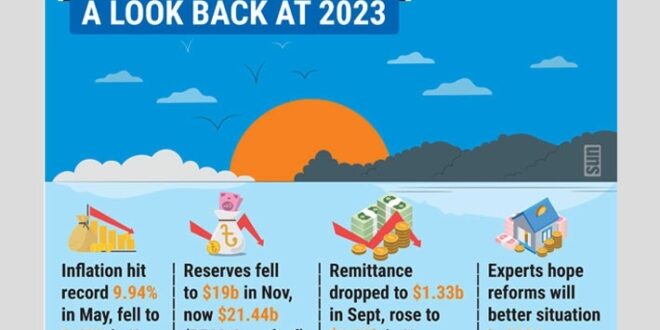Bangladesh’s economy was beset by enormous challenges in 2023, including soaring inflation and depleting forex reserves, but optimism is in the air with the beginning of the new year as some key indicators are showing signs of improvement.
Bangladeshis faced the double whammy of runaway inflation and skyrocketing prices of essential commodities last year, which made life utterly miserable. The poor and the middle class bore the brunt.
On the other hand, the business community found itself in dire straits because of persistent dollar crisis and stagnant private investment. Export earnings rose but still were below expectations while imports fell.
Nevertheless, the situation will be better and there will be a turnaround in the economy in 2024, experts hope.
Former lead economist at the World Bank’s Dhaka Office Zahid Hussain told the Daily Sun high inflation, dollar crisis, and the financial sector’s vulnerability are currently the three major barriers to growth.
“Dollar prices may level off after the steep rise caused by the Russia-Ukraine war. If Bangladesh can tackle the dollar crisis and inflation, the economy will be in a better state in the new year.”
Planning Minister MA Mannan said domestic production would increase and the supply system would improve in 2024, giving the overall economy a much-needed boost.
Inflation remained above 9% for nine consecutive months between March and November last year. In March, it hit 9.33% and rose to 9.93% in October. However, it cooled down to 9.49% in November. Moreover, both food and non-food inflation declined in November.
Economists said the seasonal abundance of certain food items and the policy measures taken by the central bank led to the decline in inflation.
The banking sector was plagued by defaults and irregularities in 2023. The Centre for Policy Dialogue said over Tk92,000 crore had been embezzled via banking scams between 2008 and 2023. It stressed the need for reforms in the banking sector in 2024.
In fact, reforms have already started. In December, the Bangladesh Bank dissolved the National Bank board as mismanagement made the private bank fragile. The banking regulator also took various initiatives to improve the conditions of nine other weak banks.
The Awami League in its 12th national election manifesto said strict laws would be enforced to recover default loans while import and export trade would be balanced, which would reduce uncertainties in foreign exchange supply. It also said steps would be taken to ensure that banks would maintain the required reserves.
Mustafa K Mujeri, former chief economist at the Bangladesh Bank, told the Daily Sun efficient management in the overall economy is needed to remove uncertainties.
The desired result can be achieved by implementing reforms, he said, hoping uncertainties would decrease after the elections.
Bangladesh-Thai Chamber of Commerce and Industry President Shams Mahmud said mismanagement in government projects needs to be reined in as increased costs are a source of inflationary effects.
“The stock market needs to function better as an alternative source to raise funds. Reforms on the revenue side are also needed. There should be more efforts to widen the tax net,” said Shams, also the former president of Dhaka Chamber of Commerce and Industry.
Bangladesh’s foreign exchange reserves have been falling for more than a year, primarily due to higher import payments as well as lower than expected export earnings and remittance inflows.
However, reserves increased to $21.44 billion in December as per the International Monetary Fund’s calculation. Besides, the central bank said gross reserves, including Export Development Fund and loans from reserves, stood at $26.82 billion at the end of 2023.
A downward trend marked remittances in early FY24, with expatriates sending home $1.97 billion in July, $1.59 billion in August, and $1.33 billion in September. To increase remittance inflows through legal channels in order to stabilise the forex market, the government took various initiatives, including raising incentives.
Remitters now get additional incentives of up to 2.5% from banks apart from the 2.5% offered by the government. The measure worked as remittance increased, with the amount jumping to $1.98 billion in October but then slightly falling to $1.93 billion in November.
Till 22 December, expatriates remitted $1.5 billion. Experts hope remittances will see an upward trend in 2024.
(DS)
 Welcome to Business Outlook
Welcome to Business Outlook




